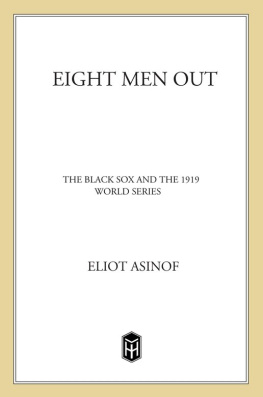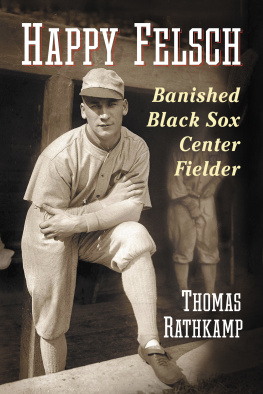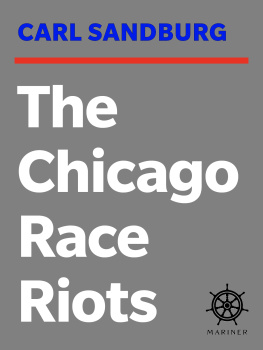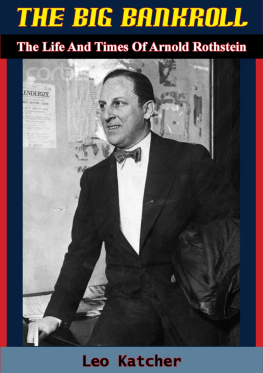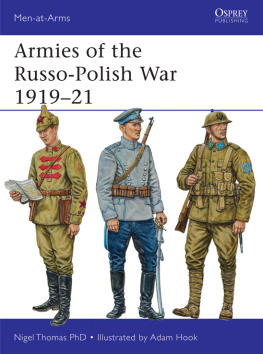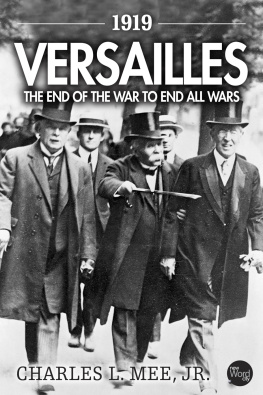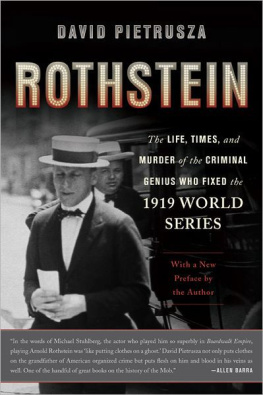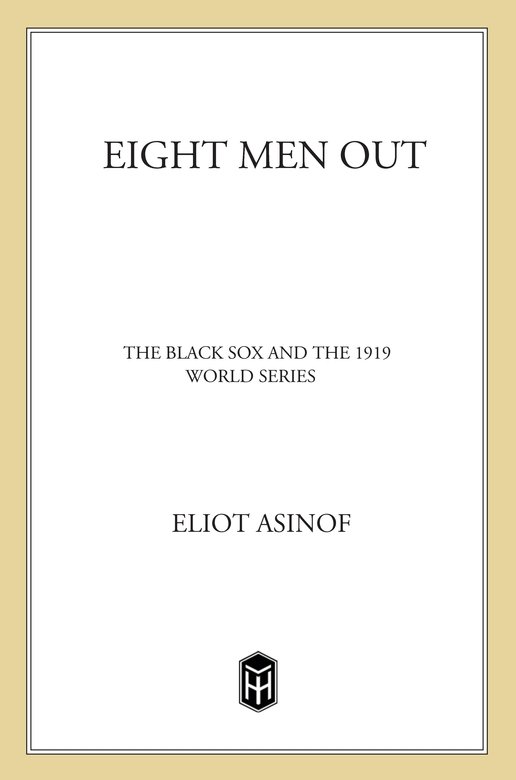On the morning of October 1, 1919, the sun rose in a clear blue sky over the city of Cincinnati. The temperature would climb to a sultry 83 by midafternoon. It was almost too good to be true, for the forecast had been ominous. From early morning, the sidewalks were jammed. A brightly clad band marched through the streets playing Therell be a hot time in the old town tonight. Stores were open but business came to a standstill. There was only one thing on everybodys lips: The World Series.
Cincinnati had never been host to a World Series before. Nor did its citizens dream, at the start of the season, that the Reds would do much better than last years weak third in the National League. Somehow the Reds had worked a miracle, which is exactly what the fans called their triumph. For winning the pennant, Manager Pat Moran was known as the Miracle Man.
Cincinnati is nuts with baseball! wrote syndicated columnist Bugs Baer. They ought to call this town Cincin nutty!
The first two games of the Series were to be played here and every seat had long since been sold. Ticket scalpers were getting the phenomenal price of $50 a pair. Every hotel room was taken; visitors found themselves jammed three and four to a room, thankful to have a bed. In private homes, families crowded into one room and hung hastily made signs ROOMS FOR RENT on their front doors. City officials, recognizing the extraordinary conditions, announced that the public parks would be available to those who could not secure accommodations. Visitors slept on wooden benches, officially assured that added police patrols would protect them from thieves.
The center of all this activity was the Sinton, Cincinnatis leading hotel, which appeared to be bursting at the seams. The huge lobby was barely large enough for the throngs who used it as a meetingplace. Through it went such notables as Senator Warren G. Harding, entertainer and songwriter George M. Cohan, former star pitcher Christy Mathewson, brilliant young writer Ring Lardner. The restaurant and coffee shop were constantly overcrowded. The management had the foresight to triple its food purchases, reaching a staggering sum of $5,000 a day. The bakery boasted a daily production of seven thousand rolls.
To the hard-nosed New York newspaperman, Damon Runyon, the big day started like this:
The crowds coagulate at hotel entrances. Soft hats predominate. Its a mid-Western, semi-Southern town. Hard-boiled derbys mark the Easterners. The streets of old Cincy have been packed for hours. People get up before breakfast in these parts. The thoroughfares leading to Redland Field have been echoing to the tramp of feet, the honk of auto horns since daylight. It is said that some people kept watch and ward at the ballpark all night long. Might as well stay there as any place in this town. They would have had the same amount of excitement. Flocks of jitneys go squeaking through the streets. This is the heart of the jitney belt. A jitney is the easiest thing obtainable in Cincy. A drink is next . Cincy is a dry townas dry as the Atlantic Ocean.
The excitement of the Series was prevalent throughout the country. The games would be telegraphed to every major city in America. Halls were hired to which Western Union would relay the action, play by play. Fans would experience the curious sensation of cheering a third strike or a base hit in a smoke-filled room a thousand miles from the scene. Over 100,000 miles of wire were to be used for this purpose, servicing 10,000 scoreboards in 250 cities, from Winnipeg, Canada, to Havana, Cuba.
This was the climax of baseball, 1919, the first sporting classic to be played since the end of the World War in Europe.
On this Wednesday morning, 30,511 people paid their way into Redland Park. To the Cincinnati fans, there was a throbbing nervous excitement and a secret foreboding. For all their enthusiasm, few could realistically anticipate a Worlds Championship. Deep down inside, they foresaw the adversary walking all over them. Not even MiracleMen could be expected to stop the all-powerful colossus from the West.
For they were the Chicago White Sox, a mighty ball club with a history of triumphs. It was said that Chicago fans did not come to see them win: they came to see how . They would watch the great Eddie Cicotte, a pitcher with a seasons record of 29 victories against only 7 defeats, who would tease the Reds with his knuckle ball that came dancing unpredictably toward the hitter. They would see Ray Schalk behind the plate, a small bundle of TNT, smart, always hollering. They would see the finest defensive infield in baseball, Buck Weaver, like a cat at third base, inching ever closer to the batter, defying him to hit one by him, always laughing. And Swede Risberg on shortstop, a big, rangy man who could move to his left almost with the pitch when he sensed a hit through the middle of the diamond. On second, Eddie Collins, the smooth one, the greatest infielder of his time; he made plays that left White Sox fans gasping. And Chick Gandil on first, the giant with hands like iron. They would wait for Shoeless Joe Jackson, the left fielder, to knock down fences with the power of his big black bat. They would laugh at Happy Felsch in center, since anything that was hit out there was a sure out. And Shano Collins in right; he could run, hit, and throw with any ball club in the league. There was a growing mythology about this great team; the public had placed a stamp of invincibility on it. To Cincinnati fans who had never seen the White Sox play the image seemed frightening. These were the big-city boys coming down to show the small-towners how the game should be played. There was no other way for any real fan to see it.
There was, however, one incredible circumstance that would have a bearing on the outcome: eight members of the Chicago White Sox had agreed to throw the World Series.
Of all the big league cities one
Is easy to get lost in.
I hardly need to tell you that
The one I mean is Boston.
Ring Lardner
Exactly three weeks before the World Series was to begin, a tall, beefy, red-faced man in a white suit and bright bow tie stepped out of a taxi and walked into Bostons Hotel Buckminster. His name was Joseph Sport Sullivan. His occupation: bookmaker and gambler.
He moved through the musty lobby to the front desk, picked up the house phone, and asked to be connected with Mr. Arnold Chick Gandil. As he waited, he surveyed the subdued, conservative, old-lady atmosphere. Although he had lived in Boston all the forty-four years of his life, he could not remember when he had been here last. In his profession, he seldom did business with subdued, conservative old ladies. There was something ludicrous about the Chicago White Sox Baseball Club staying here instead of at the Somerset or the Buckingham, more commercially centered and alive. Sullivan knew the reason for the change. He made it his business to know everything about the club.
During an earlier visit to Boston, there had been some trouble. These White Sox boys were an especially volatile, spirited bunch, a club loaded with bitterness and tension. There had been an excessive amount of drinking one night, and before the party was over, they had made wrecks of the furniture. Chairs, lamps, tables, even beds had been dumped out of the windows into the courtyard below. The hotel management thereupon had advised the Chicago organization that its patronage was no longer solicited. Harry Grabiner, Secretary of the Club, decided that a more subdued atmosphere might influence the boys. The Hotel Buckminster was the result .

